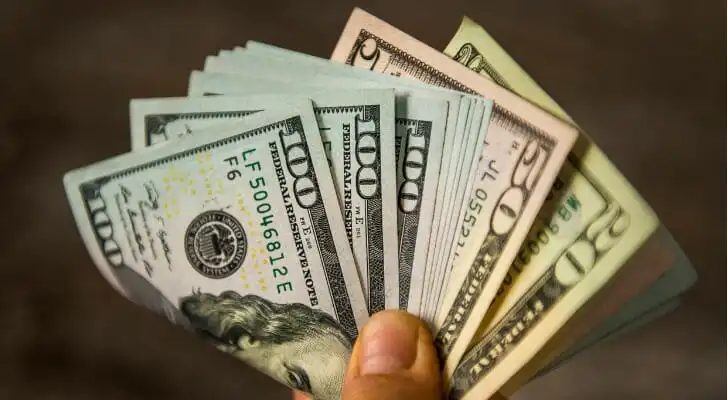
Universal basic income (UBI) is a program often proposed by futurists and progressive politicians in an effort to erase inequality. Though, many believe that it would be an economic disaster. Essentially, UBI would provide a basic allowance for everyone in a state, or throughout the entire country, and could make a big impact on your budget. But how would it work, exactly? Here’s a guide to universal basic income, the pros and cons of the concept, and a look at some places that have already tried it.
An Overview of Universal Basic Income
In general, universal basic income refers to regular cash payments made to people (for example, adult U.S. citizens) in order to increase their income. There would be minimal or no requirements for receiving the money. In some places that have implemented UBI, the cash payments replace existing social welfare programs. In others, UBI is supplemental and does not replace existing welfare programs.
It’s been proposed on a national scale in the U.S., too, most notably by entrepreneur and former 2020 Democratic presidential candidate Andrew Yang. Yang’s Freedom Dividend suggested a supplemental income program for all U.S. citizens age 18 and older, which would provide a monthly basic income of $1,000. More recently, Senator Mitt Romney proposed a one-time payment of $1,000 to every American to help alleviate the economic impact of the 2020 coronavirus pandemic.
Sometimes, the difference between UBI programs is whether the payments are distributed to individuals or households. Some UBI programs only give payments to mothers. The most predictable variances between UBI programs would be how often the payments are made, how the program is paid for and how much each payment is worth. Since each UBI plan can differ, it’s important to gain a deeper understanding of how each works.
What Are the Benefits of Universal Basic Income?

One of the simplest pros of a UBI system is that it could provide an economic floor for the poorest Americans. For instance, if you’re struggling to pay your monthly bills, $1,000 could help you afford your rent, food, and other necessities. And even if you don’t struggle to pay your bills, $1,000 could allow you to have more disposable income.
Emergency Funds
For many Americans, an extra $1,000 per month could mean being able to cover basic necessities and emergencies. A 2017 report from the U.S. Federal Reserve, which surveyed more than 6,600 adults, said that 44% of Americans could not cover a $400 emergency expense or they’d be forced to borrow or sell something to cover the expense.
If a number of Americans don’t have $400 available for an emergency situation, $1,000 a month could be a huge help. The money could allow Americans to cover any and all emergencies. People might not have to worry about their car breaking down or being able to pay for a hospital visit for a broken bone. Americans might even be able to save more money.
Disposable Income
A UBI system could be a huge economic stimulus because of the additional disposable income it would free up. High-income earners spend much less for every tax dollar saved, and economic growth is largely unaffected by how much the rich pay in taxes. If the funding for UBI was partially dependent upon raising taxes on the rich, or if it was only for certain income brackets, middle-class and low-income Americans would be getting a huge economic boost, rather than wealthy Americans.
This depends on the plan though, since a Murray plan would merely be replacing welfare benefits and wouldn’t introduce additional income to lower-earners. However, this would be true of a more left-leaning plan.
Help for Domestic Violence Survivors
UBI could help survivors of domestic violence leave their abusers. Many survivors are financially dependent upon their abusers, and having an independent source of income could be helpful when trying to leave.
According to the fundraising and public awareness campaign Allstate Foundation Purple Purse, a lack of financial knowledge or resources is the number one indicator of whether or not a domestic violence victim will leave, stay or return to an abusive relationship. Having a guaranteed minimum income might not help a survivor squirrel away funds (because the abuser might know about that income), but there would be some kind of income if they left. UBI would provide that income after the survivor left their abuser, which could help them start new.
What Are the Drawbacks of Universal Basic Income?
Except in the case of the Murray plan, UBI would end up being incredibly expensive. According to a research paper by investment management firm Bridgewater Associates, a UBI plan where every American citizen got $12,000 per year would cost $3.8 trillion. But who pays for that?
Taxes
If it’s paid for through regressive taxes, a larger percentage of income is taken from low-income earners than from high-income earners. In that case, many of the proposed benefits of UBI go down, since the income of the people who would most benefit from UBI also goes down.
If it’s paid for through progressive taxes, a larger percentage is taken from high-income earners than from low-income earners. In that situation, the benefit of giving everyone (rather than just lower-income people) a basic income goes down. The wealthy would realize they effectively get nothing from UBI, and there would be additional bureaucracy, which might even end up costing more.
Universality
If the UBI plan is truly universal, that means it’s also given to wealthy people who don’t need it. Do we need welfare for the top 1%, 10% or 25% of the population? It could be a waste of money when the bottom 10% or 20% could use that money to get out of poverty.
Wages
There is a possibility that UBI could lower wages or freeze raises. For example, some competitive fields could end up lowering entry-level salaries because they know everyone’s income is being supplemented by UBI.
Furthermore, certain entry-level jobs in fields that can become high-earning (such as politics, where interns often go unpaid) may start off at unlivable wages since those workers were receiving UBI. Would those entry-level jobs manage to find ways to pay employees less for even longer?
Inflation
There is the possibility of inflation, too. Many lower and middle-income people have necessities that they’re not able to pay for right now. With UBI, they would finally be able to pay for those necessities all at the same time, and all at once, which could drive up demand. If inflation was high enough, it would defeat the purpose of UBI. And if costs went up significantly, most people’s spending power might effectively end up being the same.
Prices would have to be raised if demand is driven up too high and supply cannot be easily increased. Higher prices would again make those basics unaffordable to lower-income people, and in the long run, a guaranteed income would not raise their standard of living.
Different UBI Systems
Support for UBI comes from both progressives and conservatives, which makes sense because UBI can be implemented in a way that aligns with progressive or conservative goals. If UBI is mainly funded by taxing top earners as well as the stock market, and is in addition to other social programs, it would be in alignment with progressive goals. If UBI is funded by replacing other social programs, that would be in alignment with conservative goals, since government programs and assistance would shrink.
There are a few different UBI systems to consider though. Charles Murray is the author of the book, “In Our Hands: A Plan to Replace the Welfare State” (2006), which laid out his UBI system. If that title didn’t give it away, Murray is a conservative critic of welfare. His book proposed giving every American $10,000 a year and catastrophic health insurance to replace existing social programs, including Social Security.
Another UBI system would be one in which the very rich (including corporations like Amazon which paid $0 in federal income tax in 2018) were taxed and that money was used to fund a UBI.
Various UBI Experiments and Results
While there have been many UBI Experiments over the years, Finland ended the world’s first national UBI experiment in February 2019. It began at the end of 2016 with 2,000 people randomly selected to take part in the trial. This group was chosen from a pool of 175,000 unemployed Finns between the ages of 25 and 58. Each selected person received 560 euros – the equivalent of about $640 – each month for two years. This experiment cost the government about $22.7 million.
Although the full results of Finland’s universal basic income trial are due in 2020, preliminary results show that it did not lead to gains in employment. The unemployed recipients of Finland’s UBI trial were no more or less likely to find employment than other unemployed citizens.
However, the group that received universal basic income in Finland showed improved health and well-being. They also reported a greater ability to concentrate than members of a control group and felt more confident in their future and the ability to influence societal issues.
Now let’s take a look at some of the other experiments with UBI, or plans to do so, and how each works or would work.
Alaska’s Permanent Fund

Alaska’s oil riches fund a dividend program known as Alaska’s Permanent Fund. It is a $60.1 billion fund, established in 1976, and collects revenue from Alaska’s oil and mineral leases to fund an annual stipend for every Alaskan resident. In 2018, every Alaskan resident received a $1,600 dividend, which cost just over $1 billion.
Researchers from the University of Pennsylvania and the University of Chicago compared the behavior of Alaskan residents before and after the dividend to determine what effects the payments had on workforce participation. The amount of full-time employment did not change, and the number of Alaskans who worked part-time jobs increased by 17%. However, women with young children worked less.
A recent study of this UBI system also showed that a $1,000 yearly stipend awarded to both children and adult residents in Alaska reduced the probability of child obesity by up to 4.5 percentage points. The study was based on a group of 11,000 Alaskan children; 2,200 of the children were classified as obese. Results showed that 22% fewer children were impacted by obesity in the group with UBI.
Additionally, the Economic Security Project, a group that backs efforts to collect data on unconditional cash stipends, commissioned a 2017 study of 1,004 Alaskan voters that showed Alaskans support the Alaska Permanent Fund. In 1984, just 29% of Alaskans said they would rather raise taxes than lose the permanent dividend. In 2017, a whopping 71% of Alaskans said they would rather raise taxes than lose the permanent dividend.
Stockton Economic Empowerment Demonstration
Stockton, California is the first U.S. city to guarantee a basic income for some of its poorest residents. This experiment randomly selected 125 residents to receive $500 a month for an 18-month period through a privately funded program.
The program, known as the Stockton Economic Empowerment Demonstration (SEED), began in February 2019. The Economic Security Project launched the program in coordination with Stockton Mayor Michael Tubbs.
Researcher Stacia Martin-West led the program’s recipient selection process. She told CBS News that the experiment was partially designed to study whether a basic income would lead to positive outcomes related to health, physical functioning, depression and anxiety. Dr. Amy Castro Baker, who co-led the recipient selection process for Stockton, in the same article for CBS News argued that handing cash directly to people can be one of the most efficient methods of public aid because people know what they need in their own lives.
Tomas Vargas Jr., one of the Stockton residents receiving basic income, agreed with that. Vargas told CBS News that he’s using the money to help his children with their education, and takes on fewer side-jobs in order to spend time with his family. He’s also working on developing an annuity with the money so that he and his family will have some extra money when the program ends in August 2020.
Andrew Yang’s Plan
As mentioned earlier, Yang proposed a program that would guarantee $1,000 per month, or $12,000 per year, to all U.S. citizens over the age of 18. While Yang made his fortune starting a series of successful companies, he largely defined his run for president by this UBI proposal.
An extra $1,000 in the bank each month is definitely not a bad thing. But how would he pay for it? According to his website, the Freedom Dividend would be funded by consolidating some welfare programs and implementing a 10% Value Added Tax (VAT).
A VAT is a tax on the production of services and goods that a corporation or business produces. Around the world, 160 out of 193 countries already have a VAT or similar tax. All of Europe has a VAT and Yang believes that a 10% VAT would “generate $800 billion in new revenue.”
The Freedom Dividend would give welfare and social program beneficiaries a choice between their current benefits or $1,000 a month of unconditional cash benefits. According to Yang, we already spend between $500 and $600 billion a year on welfare programs, food stamps, disability, and similar programs. A UBI program could give social program beneficiaries cash with no restrictions. UBI would not replace Social Security or benefits for veterans, and Yang says it could help the economy grow, with the creation of new jobs, too.
Yang has actually already created his own basic income experiment with his own money. He’s giving one family in New Hampshire and one family in Iowa a stipend of $1,000 per month for a year. Chuck Fassi had resigned from his job over a dispute with his employer and was ineligible for New Hampshire unemployment benefits as a result. Although Fassi found work after Yang began giving the family the stipend, the Fassis uses the money to pay for food and their daughter’s college education. They hope to help her graduate debt-free from college.
Bottom Line
Whether or not you’re a fan of universal basic income probably depends on the details of the plan. Who’s proposing it, and how do they plan to fund it? While there are experiments and trial runs taking place around the U.S. and the world, there may still be much to learn about UBI programs. And it may be smart to do your research before supporting or opposing a universal basic income program in your city, state or country.
Budgeting Tips
- While paying your bills on time and saving money every month is great, there may be more you could be doing to better budget and more easily hit your financial goals. If this sounds like you then you may want to talk to a financial advisor. SmartAsset’s free tool matches you with up to three financial advisors who serve your area, and you can interview your advisor matches at no cost to decide which one is right for you. If you’re ready to find an advisor who can help you achieve your financial goals, get started now.
- If your current budget isn’t working, the 50/30/20 budget could be the right alternative. This budget breaks down your monthly income into three buckets so that you have money for everything you need and want in life.
Photo credit: ©iStock.com/Ismailciydem, ©iStock.com/PRImageFactory, ©iStock.com/wutwhanfoto